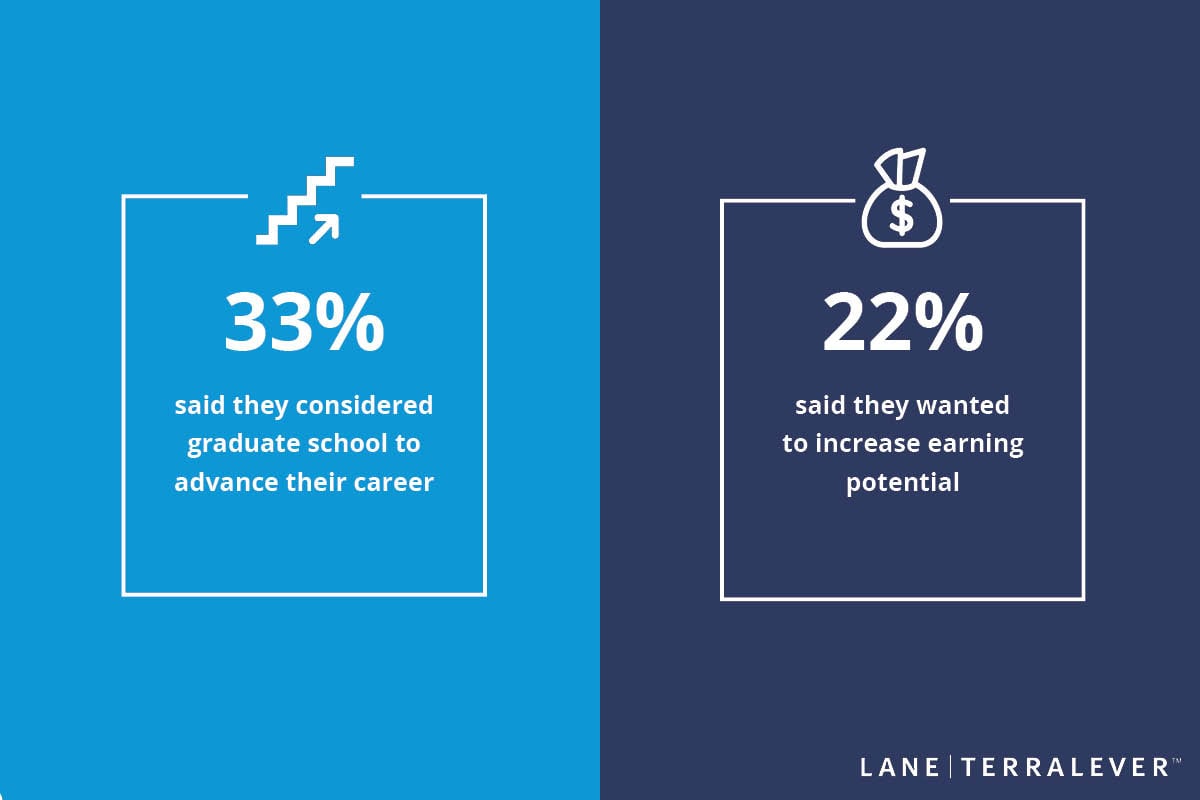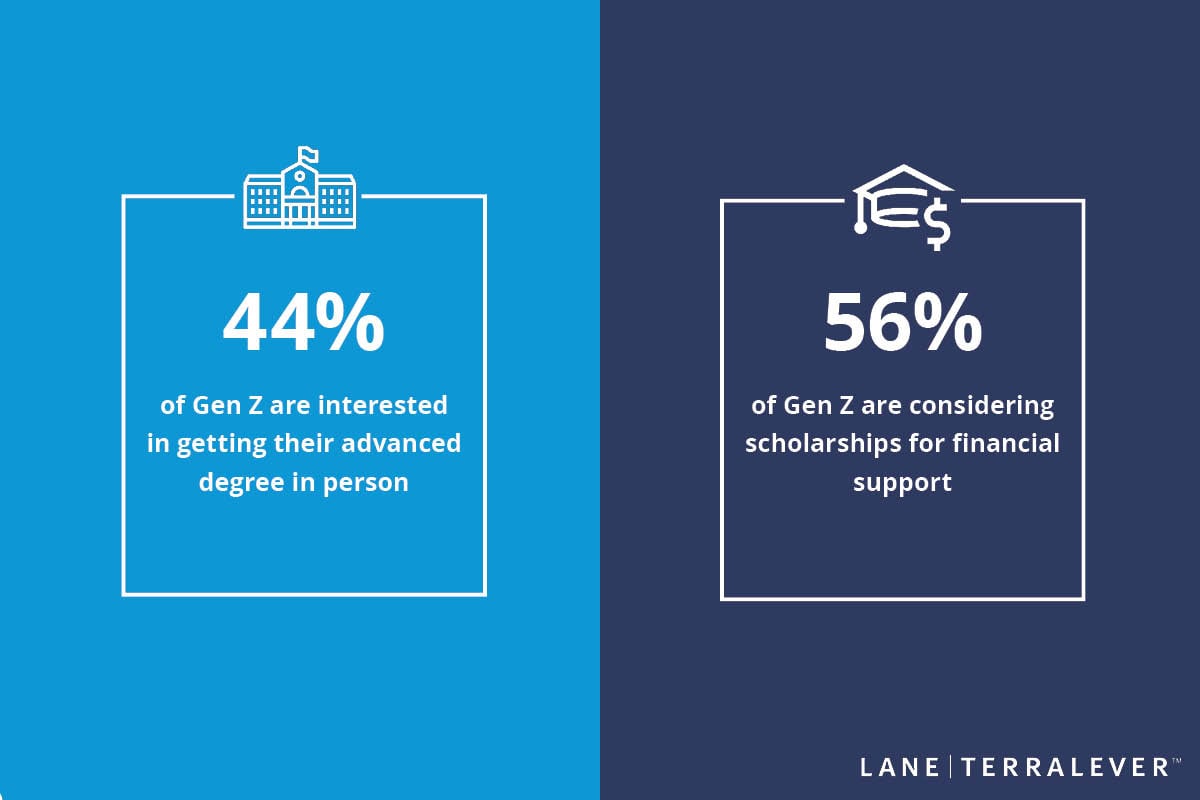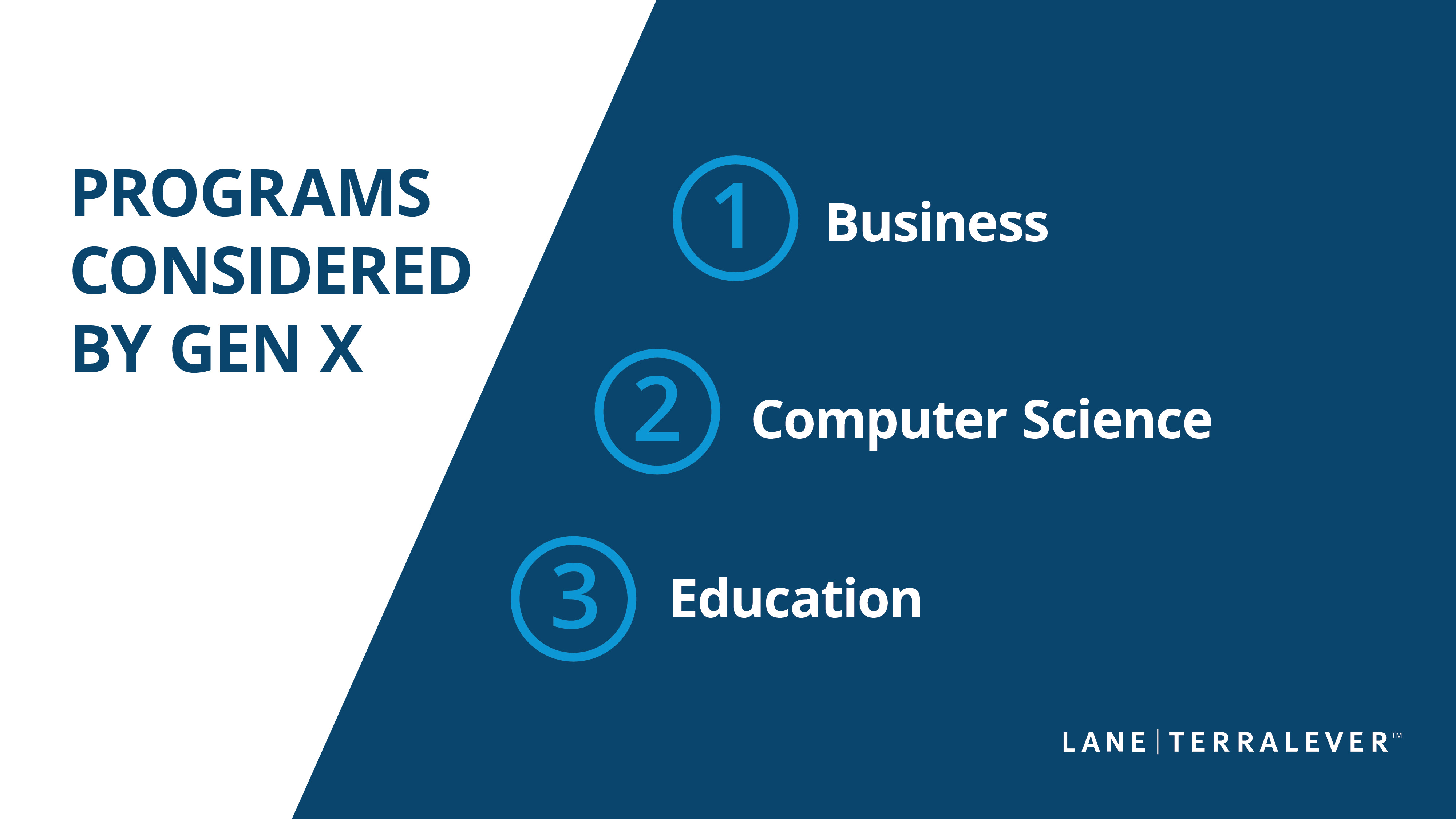Marketing Graduate Schools to Different Generations
Generation after generation, people have returned to higher education institutions in order to receive a master’s or doctoral degree that will boost their salary, further their research, advance their career, or simply give them the satisfaction of an advanced credential.
The motivations and desires surrounding graduate schools are intricate and nuanced. There is no one-size-fits-fall situation. This makes it difficult to market to graduate students. Adding complexity to this situation is the difference between generations themselves.
Each generation has its own unique characteristics, incentives, and priorities, so higher education firms have a responsibility (and opportunity) to customize graduate school marketing efforts to each generation with more effective strategies.
As a content marketing agency, our team wanted to discover how marketing to prospective graduate students could improve. So, we conducted a nationwide survey of over 1,100 participants to learn more about the student journey and what they wanted to see in higher ed marketing campaigns.
2.jpeg?width=1920&name=LT_GradBlog1+4_Graphics%20(1)2.jpeg)
The three main generations returning to school for graduate degrees are:
- Gen X (born mid-1960s to 1980)
- Millennials (born 1981 to 1996)
- Gen Z (born 1997 or later)
Here’s how to market graduate school to each generation, especially Generation Z vs Millennials, in order to maximize reach and increase enrollment.
Millennials as a Generation
Millennials have become the largest generation in the workforce and they are inching closer to their prime, if they aren’t already reaching it. They are advancing their careers, starting families, going back to school, traveling the world, working towards equity and justice, and so much more.
Here are some important overarching themes to consider when marketing to Millennials:
They have a high degree of student loan debt. Millennials have more student loan debt than other generations. Much of this debt was accrued from their undergraduate experience, so their relationship to tuition costs and paying for graduate school will be much more cautious and calculated.
Their wealth accumulation is happening later. Compared to Baby Boomers and other previous generations, Millennials are accumulating their wealth later in life. This could be due to a number of social and economic issues, as well as personal life choices, such as living at home longer to save money as inflation drives up rent and home prices.
They are the most advertised to. Millennials have seen more advertising than any generation before them. They have grown up in a time when there are increasingly more ways to buy products or render services than ever before. This also creates new opportunities when it comes to marketing to them and how they operate as customers.
Millennials as Graduate Students
When it comes to a digital marketing strategy geared toward prospective Millennial students, here are the top three insights we uncovered from our graduate student report survey.

Millennials want career advancement. From respondents in the Millennial age bracket, 33% said they considered graduate school to advance their career, while 33% said they wanted to increase earning potential.
Millennials plan to self-fund graduate school. It would appear that many Millennials are wary of loan debt and don’t see financial support as a viable option, which explains why 51% are interested in self-funding their higher education journey.
Millennials are taking more time in their decision-making. Compared to Generation Z, Millennials are taking more time to consider a return to school. Contrary to popular belief, the pandemic was actually more of a motivator, not a deterrent.
Marketing to Millennials
So, what do all these insights mean? How can they help your marketing efforts to Millennials? Here’s how.
Take a student-first approach. Leading with authentic, student-centered positioning allows prospective graduate students to see themselves in marketing materials and feel the aspirational voice inside say “I can do this.”
Keep relevant information easy to find. Even though getting an advanced degree can be an emotional decision for many, Millennials have shown to be exceptionally analytical when it comes to their research process. Ensuring the right information is readily available can streamline the decision-making process and guide them further down the funnel toward enrollment.
Make financial support options clear. This isn’t about just pushing student loans to already-in-debt-Millennials. This is about making sure prospective graduate students are aware of all available funding options. There are numerous scholarship and grant opportunities for master’s and doctoral students, and Millennials should know self-funding isn’t the only pathway they have to pay for school.
Gen Z as a Generation
Generation Z is the technology generation. They do not remember a time before smartphones and social media. Their behavior as consumers and employees are unlike any other generation, breaking previous molds and changing how business is done across all industries.
The leading researchers on Gen Z, The Center for Generational Kinetics, is an excellent resource for those to learn more about this enigmatic generation. Based on their years of research, we can isolate some very interesting themes for Gen Z.
They are fiscally conservative. Despite the popularity of influencers and fast-paced marketing tactics, Gen Z is actually very fiscally conservative. Many are even starting to save for retirement—which is astonishing considering the oldest are only 23 to 25 years old. They also prefer to earn their own money, versus just passively receiving funds from family.
They are always on their phones. Yes, this is technically true. The Center for Generational Kinetics found that “95% of this generation are on a social media app or website at least once a week.” This sounds like a lot of screen time, and while there may be a fair share of mindless scrolling, Gen Z utilizes the technology they grew up with to learn, research, work, and socialize. Just because they are on their phone a lot doesn’t mean they’re not being productive.
They are not quick to trust. Being the technology generation means they’ve also been served advertisements most of their life. This has likely led to high levels of desensitization and a critical eye that cuts through the wall of ads. Gen Z has shown us that authenticity and genuine collaborations are important to them, illustrated in the effectiveness of micro-influencers, YouTube stars, and product reviews—all pointing to the fact that Gen Z are interested in buying products and services, but from those they trust.
Gen Z as Graduate Students
When it comes to marketing to Gen Z as prospective graduate students, they have their own unique journey that aligns with the individual characteristics and motivations of the generation. Similar to Millennials, they want to advance their careers and believe graduate school is an avenue to do that.
From our graduate survey report, we uncovered these key findings.
They are quick to consider returning to school. Realistically, graduate school is only a viable option for a small percentage of Gen Z, as the oldest strata are just entering their mid-twenties. This means they are considering graduate school fresh out of their undergraduate experience. If this trend continues for the Gen Z population still working on their bachelor’s, then general grad school enrollments will continue to rise as they graduate and return back to school right away.
They are looking at financial support options. Due to Gen Z’s youthful nature, they do not have the same years under their belt like Millennials or Gen X. This means they are not working as high paying jobs at the moment, so they are going to need financial assistance to pay for school. Of our Gen Z aged respondents, 56% were considering scholarships.

They prefer on-campus options. Older generations show a preference for online and flexible options, likely in order to balance existing careers and families. Gen Z doesn’t have these same constraints on time and place, therefore, a large portion of them are more interested in getting their advanced degree in person—44% to be exact.
They are less concerned with alumni networks. Also unlike older generations, Gen Z is much less worried about a graduate school’s alumni connections. Only 37% responded that an institution’s alumni network is somewhat important. For higher education organizations, this is a huge opportunity to market specifically to this generation, and illustrate that alumni connections are very valuable to career futures.
Marketing to Gen Z
Marketing to Gen Z is an exciting new frontier that all industries should be planning for, especially colleges and universities, as this generation goes to school for both undergraduate and graduate studies.
When it comes to marketing to this group, here are some key takeaways from our graduate report.
Make your benefits obvious. This might sound obvious, but hear us out. When it comes to your website and the rest of your marketing ecosystem, prospective students need to know why they should enroll with a particular institution. Since Gen Z is taking little time in this decision-making process doesn’t mean they aren’t researching. Make sure everything you want them to know about you is up front and center.
Stand out in the sea of sameness. This sea of sameness within the higher education industry is especially prevalent in the online college space. As a higher ed firm, use your content strategy to highlight your story, your legacy, and your strengths that point to why a student should enroll with you versus a competitor.
As a seasoned higher education marketing agency, we take our time to get to know the colleges and universities we serve so we can differentiate them from the rest.
Show the benefits of alumni networks. As stated above, Gen Z is much less concerned with a school’s alumni network, but they do appear to care somewhat about a school’s prestige. Use this opportunity to align strong alumni connections with a prestigious environment, plus showcase the involvement that is possible during and after graduate school. To really sell this point, take the time to invest in marketing efforts that Gen Z will be attracted to, such as video, student ambassadors telling real stories, and making it easy to find reviews.
How to Market Graduate School to Gen X
Generation X is also an important generation to pay attention to, because, while they are older than both Millennials and Gen Z, they’re still returning to school for master’s or doctorate programs.

Gen X as Graduate Students
Prospective graduate students within Gen X have their own share of desires and motivations for going back to school. These were our key findings:
They are more traditional. Due to being farther along in life, they come from a different time of thinking. When researching, they put more focus on things like alumni networks, since this used to be (and still may be) a very big factor for college attendance. Only 24% of respondents said alumni connections were not important.
They can self-fund. Another part of being in a more advanced stage of life means they likely are able to pay to go back to school because they have had many years to start a successful career. Fifty percent of respondents to the survey plan to self-fund their advanced degree.
They want to increase their salaries. While they are probably making more money than Millennials and Gen Z, Gen X is going to graduate school to increase their earning potential (33% of respondents said this was a primary motivator).
Marketing to Gen X
There will always be some overlap in marketing to multiple generations, especially when sharing financial aid information, how to advance a career or boost earning potential.
Yet, one key part to marketing specifically to Gen X will be celebrating diversity in age, life stage, and lifestyle.
Gen X wants to see themselves in student stories and see their current phase of life respected in the graduate school experience. Show them it is possible to go back to graduate school and thrive, whether on campus or online.
How to Tailor Your Graduate School Marketing Strategies to Each Generation
LaneTerralever is a full-service marketing agency and strategic partner to higher education clients, present and future. We do extensive research on content strategy, customer journey mapping, and digital marketing to reach prospective graduate students across all generations.



